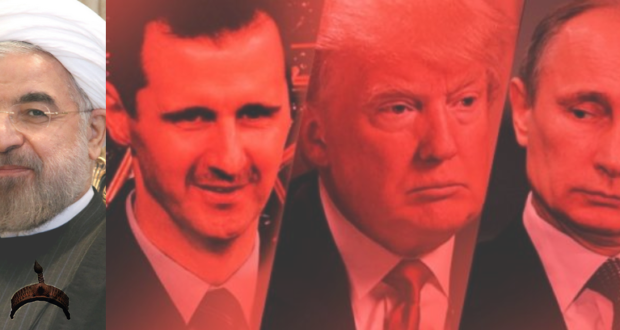By Aram Mirzaei
Just as many observers of the Syrian conflict had been thinking that the tragic crisis playing out for the past six years in the Arab country was finally about to see and end, things quickly turned around on April 4 as Syrian “opposition controlled” areas were allegedly hit by chemical weapons, a terrible crime purportedly committed by the “Assad regime”, who apparently decided to defy all logic and challenge the “International Community” to revise its decision to finally let go of the obsessive quest of regime change in Syria.
Within days, US Tomahawk missiles struck the Shayrat Airbase in the Homs governorate. The missile strikes did not result in any serious damage to the installation as the Syrian Air Force managed to restore it only a few days later. Trump and the US regime have portrayed this act of aggression as a show of force, despite them narrating it with some fantasy of Washington being the guarantor of human rights for the Syrian people.
Washington is not ready for peace, nor is it ready to admit defeat in Syria. Not only did Washington know the consequences of unilateral action against an ally of Russia’s and Iran’s, but it also knew what the result would be: continued fighting. The Syria-Russia-Iran axis had entered 2017 with a lot of confidence after the December 2016 victory of Aleppo, paving the way for a new peace process to be initiated, one that did not include Washington’s direct interference. Of course, any negotiation for peace at this moment would include the “opposition” to give major concessions rather than the government having to do so due to the waning influence of Jihadist rebels in Syria as a result of casualties sustained both during battles with government troops and as a result of infighting.
In Iran, this act of aggression was viewed as an expected move by the American side. The Iranian political establishment and leadership had long warned that neither Clinton nor Trump were any different in their approach to the Middle East. Immediately after this attack, Iran issued harsh condemnation towards the act and reiterated its position of standing by the Syrian government’s side.
Iran recently warned that such aggression won’t go unanswered with Iranian Defence Minister Hossein Dehqan adding that “The resistance front will continue to fight resolutely against terrorists despite the will of the Americans.” Concurrently, the Iranian government has worked closely with its Russian counterpart to respond to this aggression.
What I find troubling is that much of the focus of the Russian and Iranian governments official response has been on calling for an “unbiased investigation” of the incident in Khan Sheikhoun on April 4. During the following days after the US strike on the Shayrat Airbase, Iranian Foreign Minister Mohammad Javad Zarif called several times for the establishment of an international fact-finding committee to investigate the attack.
Russian President Vladimir Putin also condemned as unacceptable the “unfounded accusations” about the chemical attack, calling for an international probe. Putin “pointed out that it was unacceptable to make groundless accusations against anyone without conducting a detailed and unbiased investigation.”
Iran and Russia should by now know that it is useless to call for “unbiased investigations” in a world where Washington dominates the main international institutions charged with such investigations. Therefore, any calls for “unbiased investigations” of this incident are pointless.
Furthermore, the response towards this aggression was also relatively weak in the sense that not once did the Syrian-Iranian-Russian alliance threaten to respond militarily to this obvious act of war by Washington. This sort of restraint is not interpreted well by the West as they rather view it as a sign of weakness rather than understanding that Syria-Iran-Russia are doing their utmost to avoid a potential World War. I argue that Rogue States such as the US must be deterred from engaging in such bold acts such as the strike on Shayrat Airbase. Just as the US has “red lines”, Iran and Russia must also have red lines for what they deem as unacceptable.
On the other hand, this attack also provided the Syrian-Iranian-Russian alliance an opportunity to deepen their cooperation. Within a matter of days, communication between senior Iranian and Russian officials intensified and culminated on Friday with a joint press conference given by the three countries, showing up a unified front. With Russia’s closure of the military coordination channel devised to prevent any unwanted confrontation between Russian and US forces in Syria, chances of a Russian-Western cooperation grow dim. Russia seems to be running out of partners to cooperate with. Immediately after the US strikes, Turkish President Erdogan made headlines when he stated that Turkey would support US actions against Syria. This proved once again that Turkey is an unreliable partner and that Iran is the only country that shares Russia’s goals in Syria.
This in turn could change the Turkish stance on the diplomatic talks currently underway as Ankara could double down on its positions regarding regime change and “safe zones” in Syria. It wouldn’t come as a big surprise to me either if Turkey increased its support for the Jihadist rebels rather than pressuring them to stay committed to the ceasefire agreed upon with Russia and Iran.
It is also no secret that a potential Washington-Moscow rapprochement is viewed fearfully by Tehran who is concerned that Russia could sell out Iran in pursuit of better relations with the West. Public opinion in Iran is often very distrustful towards Russia, with some viewing Russia as an unreliable partner not being able to defend Syria from US strikes. With this in mind, Russia’s next move is very important because it will show Iran how far Moscow is ready to go to defend an ally.
On a final note, a crucial obstacle to deeper Russian-Iranian partnership has been Iran’s relationship to the Lebanese resistance movement Hezbollah and Russia’s longstanding policy of preserving a good relationship with Israel. Israel has been able to move relatively freely to violate Syrian airspace and attack the Syrian Army without Russia really responding to these actions in the past. This makes any kind of military cooperation rather limited due to Israeli diplomatic pressure. The Islamic Republic will however continue to work with Russia based on the common interests they share as these two countries share a very pragmatic relationship. A high ranking Iranian diplomat was quoted as saying “From the very beginning, there have been disagreements between Iran and Russia regarding the Syrian crisis, and this is normal. During the meeting between Rouhani and Putin, there were again discussions regarding this issue. However, it is obvious that we will act based on our own interests and without counting and relying exclusively on Russia’s actions. We knew from the very beginning that there are disagreements between Tehran and Moscow, although, there was also a high level of mutual interests between Iran and Russia with regard to Syria.”
As the relationship between Russia and the West continues to deteriorate, ties between Iran and Russia can improve, with the Syria-Iran-Russia axis growing even more unified in their campaign to combat terrorism across Syria. In the short term, necessity trumps everything else.
 Ọmọ Oòduà Naija Gist | News From Nigeria | Entertainment gist Nigeria|Networking|News.. Visit for Nigeria breaking news , Nigerian Movies , Naija music , Jobs In Nigeria , Naija News , Nollywood, Gist and more
Ọmọ Oòduà Naija Gist | News From Nigeria | Entertainment gist Nigeria|Networking|News.. Visit for Nigeria breaking news , Nigerian Movies , Naija music , Jobs In Nigeria , Naija News , Nollywood, Gist and more









